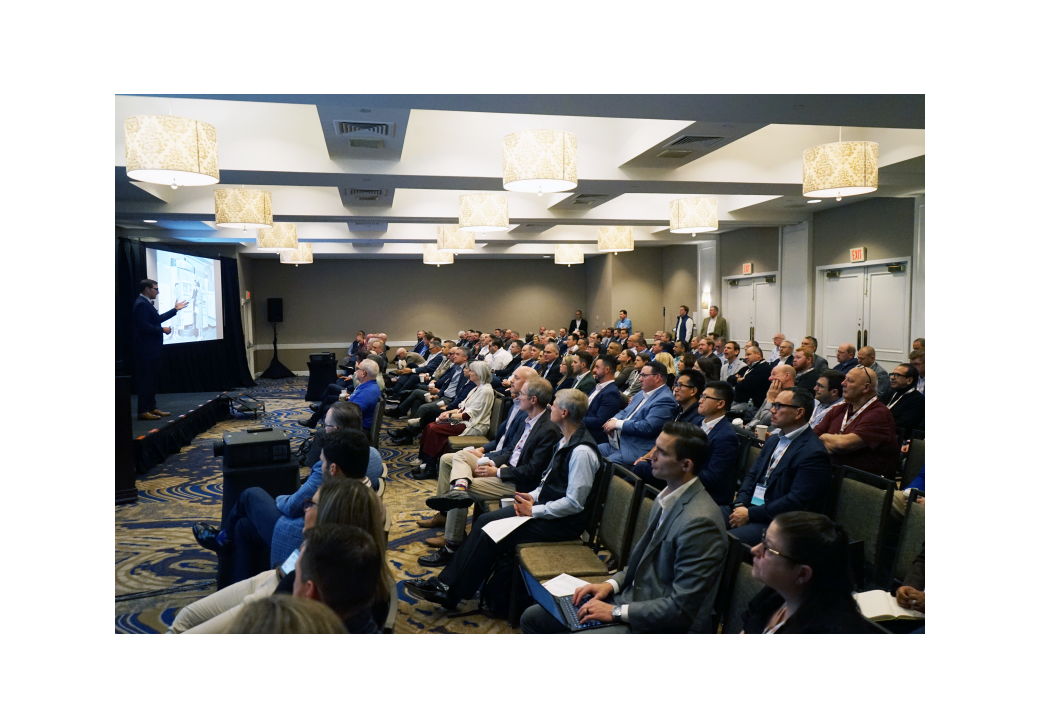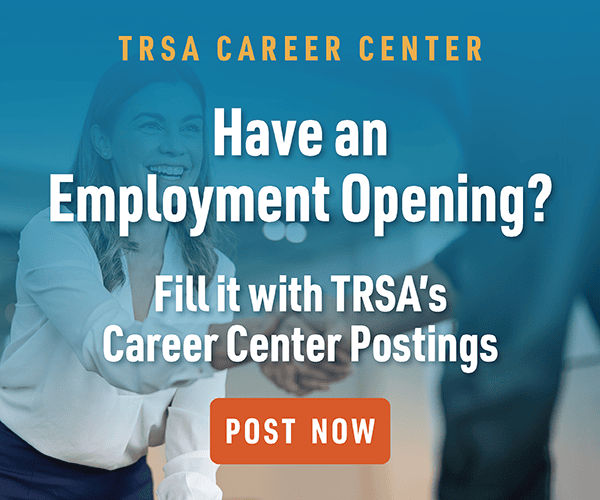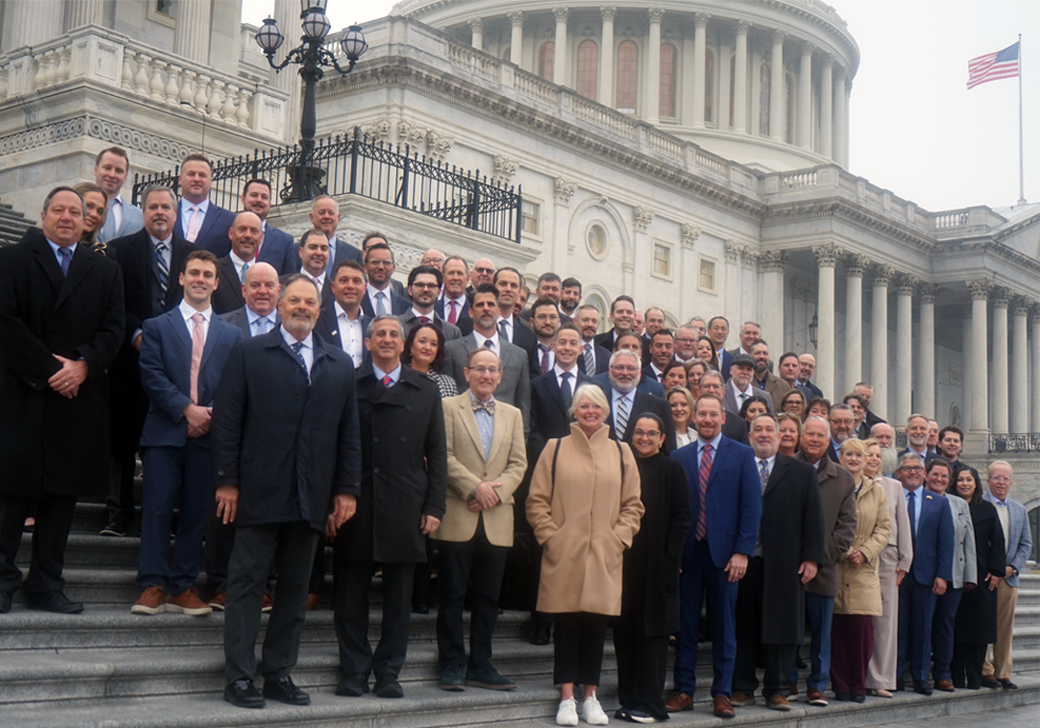TRSA held its 14th Annual Healthcare Conference in conjunction with the Eighth Annual Marketing, Sales & Service Summit in Boston, MA, on Nov. 18-20. Both events featured a record-breaking number of attendees.
The Healthcare Conference began on Nov. 18, with a CEO/Executive Roundtable where executive members of TRSA were invited to share their insights on issues facing the healthcare market. The executives discussed a myriad of touchpoints from new government regulations to succession planning within their organizations. The roundtable was followed by a shared reception with marketing, sales and service professionals to signal the conclusion of the Marketing, Sales & Service Summit and kick off the Healthcare Conference.
The educational program for the conference took place on Nov. 19, beginning with a keynote speech from Shawn DuBravac, a futurist and former chief economist. DuBravac spoke on how emerging technologies are reshaping industries, disrupting traditional business models and redefining the analog-to-digital shift. DuBravac tailored the presentation to highlight the specific implications for our industry by participating in a plant tour before the conference. DuBravac concluded his speech with “Kasparov’s Law,” to highlight the importance of embracing AI but to ensure that you have systems put in place to help it and organizations reach their full potential.
“Weak human + machine + better process was superior to a strong computer alone and, more remarkably, superior to a strong human + machine + inferior process,” DuBravac noted during his keynote address.
A panel that brought healthcare laundry and infection-control professionals together to bridge the gap between the professions immediately followed. The panel was moderated by Jesse Jassny, director of sales at MediCleanse Linen Service. In an interesting twist highlighting the collaborative spirit of the industry, the panelists were healthcare professionals representing other associations including Jenna Rivers, infection preventionist at Moffitt Cancer Center, representing APIC; James Odom Jr., director of buildings & grounds at UCONN Health, representing AHE; and Matthew Fauss, senior sourcing manager at BJC Healthcare, representing AHRMM. Kevin Schwalb, vice president of government relations at TRSA, delivered a standards and regulations update regarding the healthcare market sector following the panel.
After a brief lunch break, attendees were able to sit in on one of two breakout sessions. In one of the options, Greg Stangle, founder and president of Stangle Co., provided valuable insights into common challenges and best practices in drafting contracts for healthcare textile services. Attendees were advised how to identify potential pitfalls, structure effective agreements, and ensure alignment with regulatory and service expectations. In the other, Liz Remillong, vice president of strategic alliances at Core Linen Services, moderated a panel including Rich Kramer, president of City Uniforms and Linen; Laura Waldman, industrial engineer at Superior Linen Service; and Brian Sullivan, director of maintenance strategy and IT at Handcraft Services. The panel shared effective cost-control strategies that have successfully reduced operational expenses while maintaining high standards of quality and regulatory compliance, and gave practical insights and takeaways regarding the subject.
Remillong returned to the stage in the next general session with Stephanie Gregg, director of advisory solutions at Vizient, in a discussion moderated by TRSA President & CEO Joseph Ricci analyzing the strategic role Group Purchasing Organizations (GPOs) play in the healthcare market sector. The group discussed how GPOs contribute to cost optimization, ensuring quality and strengthening partnerships between healthcare facilities and laundry service providers. The session was highly interactive as attendees were given the opportunity to submit anonymous questions in real-time to the discussion.
A panel discussion moderated by Ken Koepper, director of membership and industry relations at TRSA, came next. The discussion delved into the latest innovations, regulatory developments and emerging trends shaping the healthcare textile industry. Industry experts discussed their perspectives on advancements in fabric technologies, sustainability initiatives, infection-control measures and compliance updates, offering attendees a comprehensive view of what’s next for the industry. The panelists included Jeff Courey, president and CEO of George Courey Inc.; Dr. Apurba Banerjee, research scientist at Standard Textile Co.; Jeremy Fogel, president of the textile division at Medline Industries Inc.; Ammar Khan, CEO of Calderon Textiles; and Syed Binali, vice president of supply chain at American Dawn.
The next panel, moderated by Dyan Troxel, director of clinical education at Handcraft Linen Services, discussed collaborative approaches and innovative solutions for infection control in the handling of linens in healthcare facilities. Panelists worked together to address emerging concerns, shared best practices, and discussed strategies to ensure the highest standards of hygiene and patient safety across healthcare environments. The panel consisted of Sarah Brobeck, president and CEO of the Association for Linen Management (ALM); Josh Green, director of materials management at UT MD Anderson Cancer Center; Monica Hollo, regional director of services at Emerald Textiles; and Gabe Nowicki, director of linen and central services at the Mayo Clinic.
In the final panel of the day, moderated by Randy Bartsch, executive chair of Ecotex Healthcare Linen Service, a dynamic group of industry leaders discussed the evolving landscape of the healthcare market sector. Panelists, including Michael Barner, CEO of CORE Linen Services; Ben Berstein, vice president of corporate development at Nixon Medical; and Phillip Foussard president at HHS-FMA Laundry, explored the implications of key market and industry trends, including healthcare sector developments, regional market dynamics, and the growing influence of decisionmakers and influencers. The discussion also analyzed the impact of sustainability initiatives – highlighting the shift toward green products and the debate between reusable versus disposable textiles, including PPE and surgical attire. The day then concluded with a networking reception.
On Nov. 20, the Lawrence, MA, location of Unitex Healthcare Laundry Services opened its doors to Healthcare Conference attendees for a plant tour. Now in its fourth generation of family ownership, Unitex has been in business for more than 100 years. Unitex facilities are so advanced and environmentally friendly that more than 1,400 industry professionals worldwide have visited them to see how they run their operation.
This 180,000-square-foot facility, opened in 2022, reflects Unitex’s commitment to efficiency, innovation and service excellence. The facility contains both a bulk healthcare and an outpatient medical plant. Combined, it currently produces approximately 58 million pounds per year with a capacity of 80 million pounds. The plant has made a significant impact on the local community by creating new jobs in Lawrence, MA. The staff includes 300 full-time employees currently. The Lawrence plant was awarded TRSA’s 2025 Best Plant of the Year Gold Level Award. Generations of leadership for Unitex including Michael Potack, chairman; David Potack, president; and Robert Potack, CEO, personally greeted each attendee with a handshake as they entered the plant and led groups for the tour.
The 15th Annual Healthcare Conference will take place on October 14-15, 2026, at The Catamaran Resort & Spa in San Diego. Click here for details.
Publish Date
November 21, 2025
Categories
Sign Up For Our Newsletter
Receive the latest updates on the linen, uniform and facility services industry from TRSA delivered straight to your inbox.








